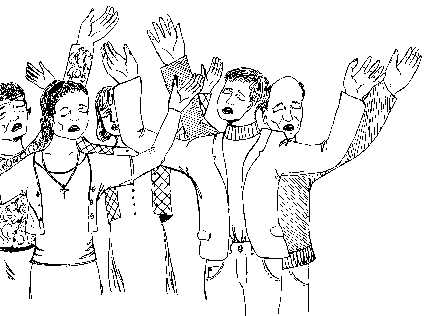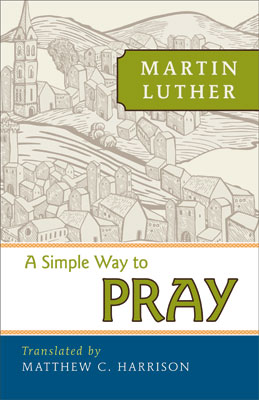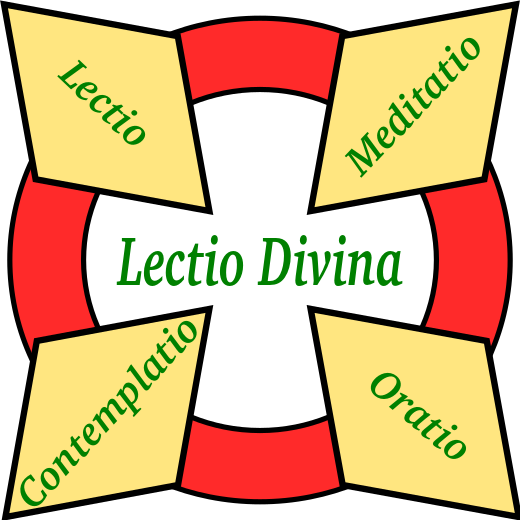Rites of Worship are the special ceremonies which exist in the
Church for the sake of good order, blessings, and commendation for official
acts of the Church. Rites indicate a special event in a Christian’s life and/or
the life of the Church. Each rite focuses on the doctrine of salvation in
Christ, contains ritualistic elements, prayers, confessions of faith, and
special blessing. Rites are best seen in light of the Divine Service, which
stands at the center of the Church’s life. Each rite focuses on the God who
serves us in worship and who redeemed us to be His people through the sacrifice
of His Son, our Lord, Jesus Christ. Some rites are public, while others are of
a more private nature. The following are those major occasional rights and
Services not in the Divine Service. Those used less frequent and more elements
concerning the major rites are explained in greater detail and liturgy in the Lutheran Service Book Agenda and/or Altar Book.
Perhaps the most central rite of the Church, and of Christian
faith and life, is the Rite of Baptism.
In Holy Baptism, the triune God claims us as His own by the blood of Christ
(Col. 1:13-14). In Baptism, the Christian is joined to Jesus’ death and
resurrection, clothed in the righteousness of Christ, given the gift of the
Holy Spirit, and made a member of Christ’s body, the Church (Acts 2:38-39; Rom.
6:3-4; Gal. 3:26-27; Titus 3:4-7). In this sense, there is only one type of
membership in the church: baptized membership. This rite typically includes the
“Flood Prayer” from Luther’s baptismal rite (highlighting baptismal imagery
from the Old Testament events of the flood and crossing of the Red Sea), the
Lord’s Prayer, the Baptismal Creed (the Apostles’ Creed), the threefold
renunciation of Satan, and the application of water applied (through pouring or
emersion) in the name of the triune God.
The Rite of Confirmation,
though not commanded by Holy Scripture, is a historic tradition, in various
forms, that dates back to the earliest Christian and is only seen clearly in
light of Baptism. For this reason, the liturgy of Confirmation closely
resembles that of the Baptismal liturgy. Confirmation marks a catechumen’s
(student) confession of faith after a period of thorough catechesis (teaching)
in the doctrine of the Church, as expounded in the Small Catechism. It is the
celebration of the gifts God has given in Baptism and gives opportunity for a
public confession of faith and pledge of lifelong devotion to Christ before the
Church. It must be guarded against the idea that Confirmation is the completion
of Baptism or a sort of graduation; for God has already worked faith and life
through Baptism, while learning, confession of faith, and devotion to Christ
are lifelong activities which never cease. Confirmation is only a step in a
person’s spiritual life. Typically in the Lutheran Church today, Confirmation
occurs with children after two years of study ending in the 8th
grade, though this can vary widely. First
Communion is typically tied to this rite, but may occur before catechesis
is completed or at a later date. With
adults the rite occurs as time allows. Reception
of Members by Confession of Faith or
Transfer of Membership is also related to this rite.
The Rite of Holy Matrimony
is perhaps the most public of all the rites.
The willing and deliberate desire for a man and a woman to live in
mutual love “as long as both shall live” was engendered in them by their
Creator (Gen. 2:24; Matt. 19:4-6; Eph. 5:21-23). In God’s plan they are to be
living examples of the relationship between Christ (the bridegroom) and His
Church (the bride). Marriage may be performed by civil authorities, apart from
the Church. While such ceremonies are good according to “civil (horizontal)
righteousness” they do not speak God’s blessing or implore His grace and aid
for a sanctified marriage and omit “spiritual (vertical) righteousness.” As a Christian rite, it is important to be
reminded that the wedding itself is a Worship Service. Clothed in Scripture and
prayer throughout the rite, the couple gives mutual consent and promise,
receives the Lord’s blessing on their union as they begin their new vocations
as husband and wife in their “one-flesh union” (Gen. 2:24).
The last rite for a person occurs at death. The incarnation of the
Son of God signals the death of death and victory of life. Jesus meets death head on in His crucifixion,
and gives us life by His resurrection. The Rite
of Christian Burial includes the Commendation
for the Dying, Funeral Service, Committal, and Commemoration of the Faithfully
Departed (Memorial Service). In this rite(s), two emphases are held in
tension: penitence and the resurrection. As we face the ultimate consequence of
sin, we are reminded of our need for a savior and the certain hope we have in
Christ and our everlasting life with Him as our savior. Heavy emphasis is
placed on Baptism, for in Baptism we have the surest evidence of our hope in
the
Several rites exist to help celebrate and mark the special events,
people, and things within the life of the Church. Rites pertaining to the Holy
Ministry begin with the Rite of
Ordination. The Office of the
Holy Ministry has been instituted by Christ Himself as a gift to His Church
(John 20:19-23; Eph. 4:11-16). Through the Christian congregation, as the
holder of all churchly authority, God calls qualified men to fill this divinely
established office and sends them as His ministers to proclaim the Gospel of
Jesus Christ and to administer the Sacraments publicly in the stead of Christ
and by His command, with accountability both to God and to the Church (Matt.
10:1-5; 28:18-20; Rom. 10:14-15; 1 Cor. 11:23-25; 1 Tim. 2:1-12). According to
apostolic usage, the Rite of Ordination is the solemn, public confirmation of
that divine call (1 Tim. 4:14-16; Titus 1:5-9). The Rite of Ordination
encompasses several actions: recognition by the Church as one prepared,
examined, and called to this divinely instituted office; the Holy Spirit
invoked on behalf of the ordained to bless and equip him for the work of the
holy ministry; Scriptures read that speak to the Office of the Holy Ministry in
terms of its requirements and obligations; vows to confessional fidelity and
accountability; the Lord’s mandate from John 20:21-23; a red stole laid over
the neck and shoulders of the newly ordained as an insignia of office; laying
on of hands by other Ordained Ministers; the ordained given to the
congregation; and prayers for the ordained and congregation.
Related to
Ordination is the Rite of Installation of
a Pastor (in which the ordination vows are echoed). The difference between
Ordination and Installation is that Ordination is the Church’s recognition that
a man has been rightly called to the Office of Holy Ministry, whereas
Installation marks the beginning of a pastor’s work in a particular place. Also included are the Rites of Anniversary of Ordination, Installation of Ordained
Professor/Teacher, and Farewell and
Godspeed to a Pastor.
Similar to those pertaining to the Holy Ministry are the Rites of Auxiliary and Congregational
Offices – installations, commissions, recognitions, and farewells. Numerous
occasions in the life of the Church call for special recognition and
celebration to facilitate the observance of special events; and encourage the
intercession of God’s people for those involved in various aspects of the Church’s
life and mission as teachers, Directors of Christian Education, deacons,
congregational officers, and the like.
Rites of Blessing
are also important rites within the life of God’s church. God’s blessing is to
be implored not only for people, but also for material things (Ex. 40). These
emphasize the Christian teaching that material possessions are gifts from our
good and gracious God to be used in service to others and for the praise of His
holy Name. Every good gift comes from the Father (James 1:17). All that God
created is good (Gen. 1) and is to be received from Him with thanksgiving,
being sanctified by the Word of God and prayer (1 Tim. 4:4-5). Language that
emphasizes God as the One who blesses His gifts for use in the Church
characterizes these rites. Hence, in the blessing formula, “Almighty God bless
this…,” the name of God is connected with the blessing. The Rites of Blessing
fall into three categories related to ecclesiastical life – buildings,
furnishings, and seasonal blessings – and into several categories related to
the Christian life and home. Each rite follows the same basic pattern including
appropriate readings from Scripture, prayer, and the blessing of God implored
on the place, person, or thing. By these rites, the Church celebrates and gives
thanks to God for all things.
note: post adapted from my brother's writings











